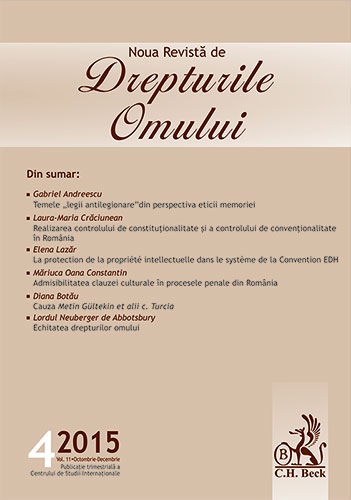Temele „legii antilegionare” din perspectiva eticii memoriei
“The anti-legionary law” as a matter of the ethics of memory
Author(s): Gabriel AndreescuSubject(s): Politics / Political Sciences, History, Social Sciences, Law, Constitution, Jurisprudence
Published by: Centrul de Studii Internationale
Keywords: legionary movement; fascism; communism; People’s Tribunal; ethics of memory; ethnicization of the ethics of memory; Law no. 217/2015; OUG no. 31/2002
Summary/Abstract: This study was written in answer to the widespread debate created by the passing of Law no. 217/2015 to amend OUG no. 31/2002. It analyses the context in which the draft law was created, its argumentation, and the reactions before and after the passing of the law. One part of the study is dedicated to the main issue of concern, the banning of organizations based on ideological criteria. I showed that the option between a single or two separate laws addressing the fascist and communist past should be treated with nuance. Using as an interpretive framework the ethics of memory, I analyzed the ethnicization of the ethics of memory, and the issue of ethical respectability and legitimacy regarding the researchers and the moral ideals of the „Elie Wiesel” Institute. I showed that the purpose and motivation of a humanist ethics of memory have been supported in the last years by the European doctrine for addressing the communist past and the ECHR jurisprudence. I made a few observations regarding the definition used by the law for „the Holocaust in Romania”, I analyzed available knowledge on the gravity of anti-Semitism in Romania, and on the dangerousness of legionarism if it existed today. The intention to re-legitimize the People’s Tribunals was evaluated from the point of view of the ECHR jurisprudence.
Journal: Noua Revistă de Drepturile Omului
- Issue Year: 11/2015
- Issue No: 4
- Page Range: 3-43
- Page Count: 41
- Language: Romanian

